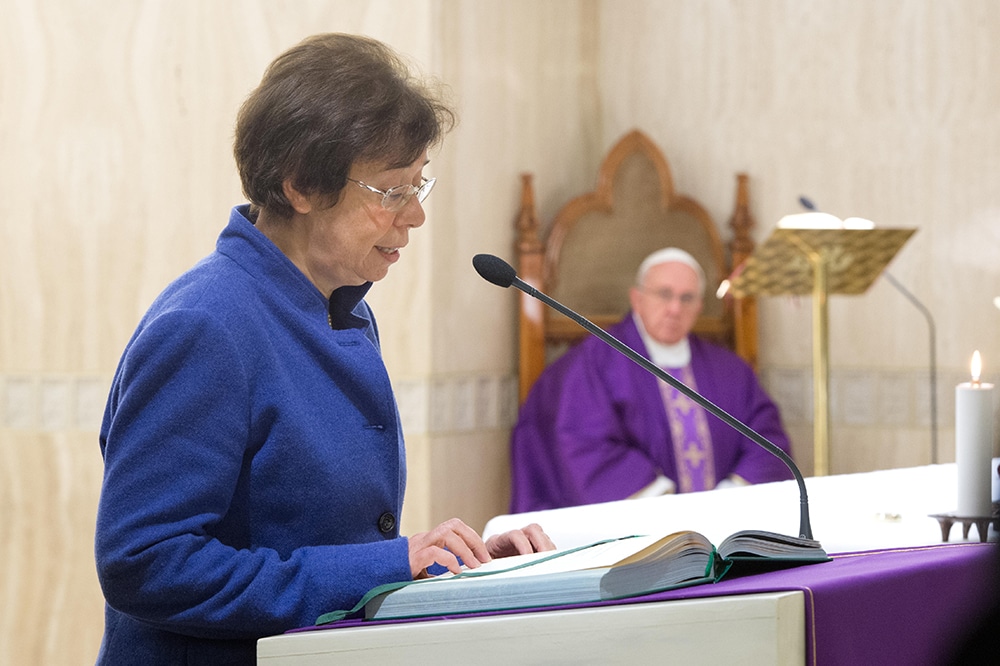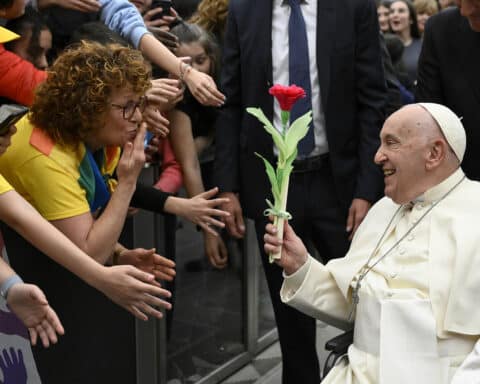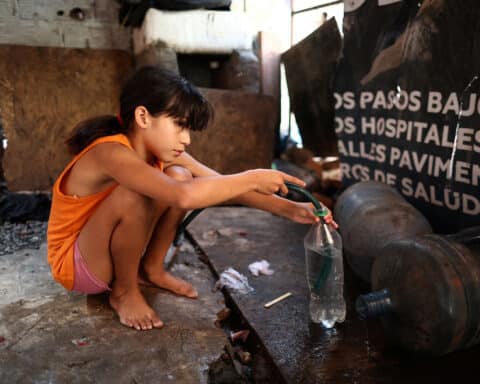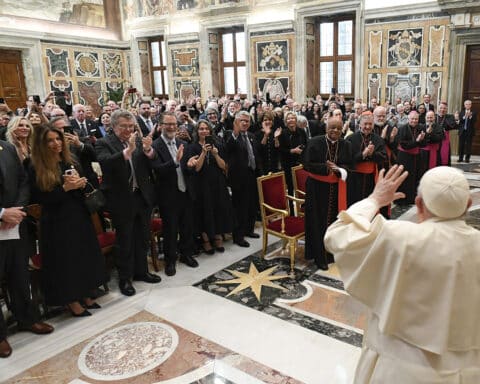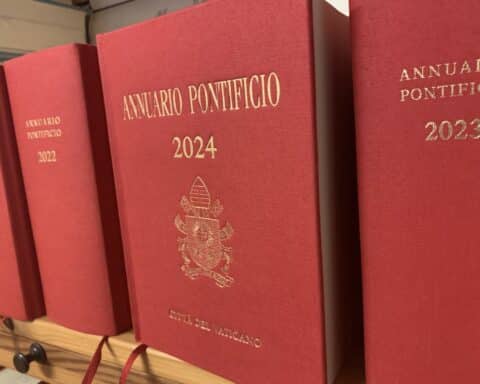Last January, Pope Francis appointed Dr. Francesca Di Giovanni as undersecretary for the multilateral sector of the Vatican Secretariat of State’s Section for Relations with States, making her the first woman to hold a managerial role in the Secretariat of State.
As she nears the anniversary of her appointment, Our Sunday Visitor spoke with Di Giovanni earlier this month in an exclusive interview, during which she offered the following reflection, saying it inspires her to remember how God is among us all the year, not only at Christmas. She said:
“The gift that God gives us by becoming a child is something that always amazes me, moves me. It is an immense gift, and receiving this gift prompts me to live in a way that God can always be among us. It is wonderful that God wanted to be born into a family — a normal family, but in which God was present.”
With the highest diplomatic role ever entrusted to a woman at the Vatican, the accomplished 67-year-old Palermo native’s position concerns the relations of the Holy See with international, governmental and intergovernmental organizations, and with the system of various treaties that the states adopt from time to time on the various issues that require an international commitment. “We work toward the common good of nations,” she said, “which can be human rights, development, environmental protection, the status of women” among others.
In the interview, she discusses how she’s been welcomed during first year in her new role, including warmhearted joking from Pope Francis, and what her appointment means for the very gradual, but always greater role of women in the small sovereign state, as well as her faith.
The Vatican diplomat this Advent shares how the closeness of Baby Jesus to each of us, through the humble family of Nazareth, is especially touching for her. Moreover, she reflects on, in the light of Pope Francis having just proclaimed this the year of St. Joseph, and how the humble carpenter can call each of us, and herself, to examine whether we welcome the surprises the Lord gives us.
Our Sunday Visitor: Dr. Di Giovanni, we are closing in on the one-year anniversary of your nomination. Since you took office, the COVID-19 pandemic has changed the world in a completely unexpected way. What has been the impact of these changes on your work?
Dr. Francesca Di Giovanni: Unfortunately, the year 2020 was marked by the pandemic and all that came with it: suffering, deaths, increased poverty and hunger, increased situations of violence in homes and outside. It increased the number and severity of these crises already present before this year, together with phenomena due to climate change and other tensions. We all have in our eyes and hearts the image — and even more so, the words — of the pope in the deserted St. Peter’s Square during the lockdown period.
Even on our work the impact was quite strong. We had to interrupt trips and even face-to-face meetings, which are important in our work because face-to-face confrontation is important to find shared solutions, not imposed by those who shout the loudest. We have tried to make up for it with virtual meetings, online. This change was slow at first, then online encounters multiplied, since one cannot travel. Actually, this change has given us a lot more work, because by saving travel time, you can work more and do more things [smiling].
Our Sunday Visitor: Do you see your appointment a year ago as a kind of “welcome” to a new season in which women with qualified professional backgrounds take on important roles in the Vatican?
Di Giovanni: Yes, I hope so. In fact, even Pope Francis at the beginning of 2020 said that he hopes there will be more women, even in the Vatican, with managerial roles, in the Roman Curia. I hope that we women can be even more numerous, to make our specific contribution, not out of thirst for power, but really because I feel that as women, we can make our own contribution.
Our Sunday Visitor: How was your welcome to this new position?
Di Giovanni: I have been working in the Vatican for many years now. I feel well received. But I still feel that for some, seeing a woman who holds my post as undersecretary is something new. Even Pope Francis often jokes when he meets me: “Where is your cassock? Where is the sash?” [smiling].
Our Sunday Visitor: How did you find the position? What are the satisfactions it has given you? What are your hopes for the near future?
Di Giovanni: Honestly, this is a job I hadn’t thought of for myself, because I know how much effort it takes. It is a demanding job, where everything is urgent — similar to journalists, right? But next to gratitude for [Pope] Francis and for those who trust me, what gives me the most joy is working with great collaboration with colleagues, with mutual patience, professionalism, making their knowledge available to others and being able to give up even their own ideas … when you understand that what comes from comparing, is better than your idea. The result is beautiful precisely because everyone makes their contribution, like the pieces of a mosaic. After all, we are not many in our sector, so only with this mutual generosity can we carry out our work.
Our Sunday Visitor: We are in the midst of Advent. Is there a particular saint or devotion whom you hold particularly dear this time of year?
Di Giovanni: I must tell the truth. I have no particular devotion or saint to whom I am especially devoted. But the gift that God gives us by becoming a child is something that always amazes me, moves me. It is an immense gift, and receiving this gift prompts me to live in a way that God can always be among us. It is wonderful that God wanted to be born into a family, to have a mommy and daddy, a normal family. … In fact, he was for everyone “the carpenter’s son.” … It was a normal family in which, however, God was present. And that pushes me to live in such a way that God can always be among us, not just at Christmas.
Our Sunday Visitor: Speaking of the Family of Nazareth, the pope has just announced a special year dedicated to St. Joseph. How did you receive this announcement?
Di Giovanni: With so much joy, because St. Joseph is an incredible saint — a normal man who nevertheless knew how to accept what God wanted to say to him. This amazes me and makes me ask myself: What about me? Would I be able to welcome the messages that God sends me, day after day, like St. Joseph?
Pope Francis speaks of the four dreams of Joseph in the Gospel. Joseph immediately took action to follow the messages received in dreams. I like this very much. … St. Joseph was a tender father. Not everyone has known the tenderness of a father. If in this year we can discover the tenderness of that father who is God, I think it would be a beautiful moment that would give hope to many people.
Our Sunday Visitor: Due to the pandemic, this Christmas cannot be celebrated like other ones, even in the Vatican. How can you not lose sight of the spirit of this holiday?
Di Giovanni: Perhaps we can welcome the true meaning of Christmas more carefully. Even Pope Francis, on Sunday Dec. 6, explained how to welcome the message of Advent: It takes conversion — that is, to be more attentive to God, to change our perspective, to no longer be attached to fame, power, money, to all that is worldly. This is the most authentic happiness that lasts forever, and that no pandemic can take away from us.
As the Pope said, conversion “is not an end in itself; it is not an ascesis only to do penance: a Christian is not a ‘fakir.’ Conversion, he suggests, is a means of attaining something greater — namely, the Kingdom of God.” This light is not only for us Christians, we can give it to everyone.
Our Sunday Visitor: How are you living this Advent?
Di Giovanni: I am trying to take advantage of today’s circumstances, with less of a focus this year on consumerism and less possibility to travel. Perhaps in 2020 we are being given a chance to live precisely for this reason: We are given a chance to live Advent in anticipation of what God can suggest to us, and also by listening to the needs of many brothers. More and more often we hear of people who lose their jobs, or that they are alone. … This is how I try to live this Advent.
Our Sunday Visitor: Is there anything you would like to add?
Di Giovanni: I just want to add a wish, a desire, that this spirit of mutual help spread also in the sphere of international relations, where often what is lacking is mutual trust and hope. But it is always possible to start collaborating again.
Deborah Castellano Lubov writes from Rome.

